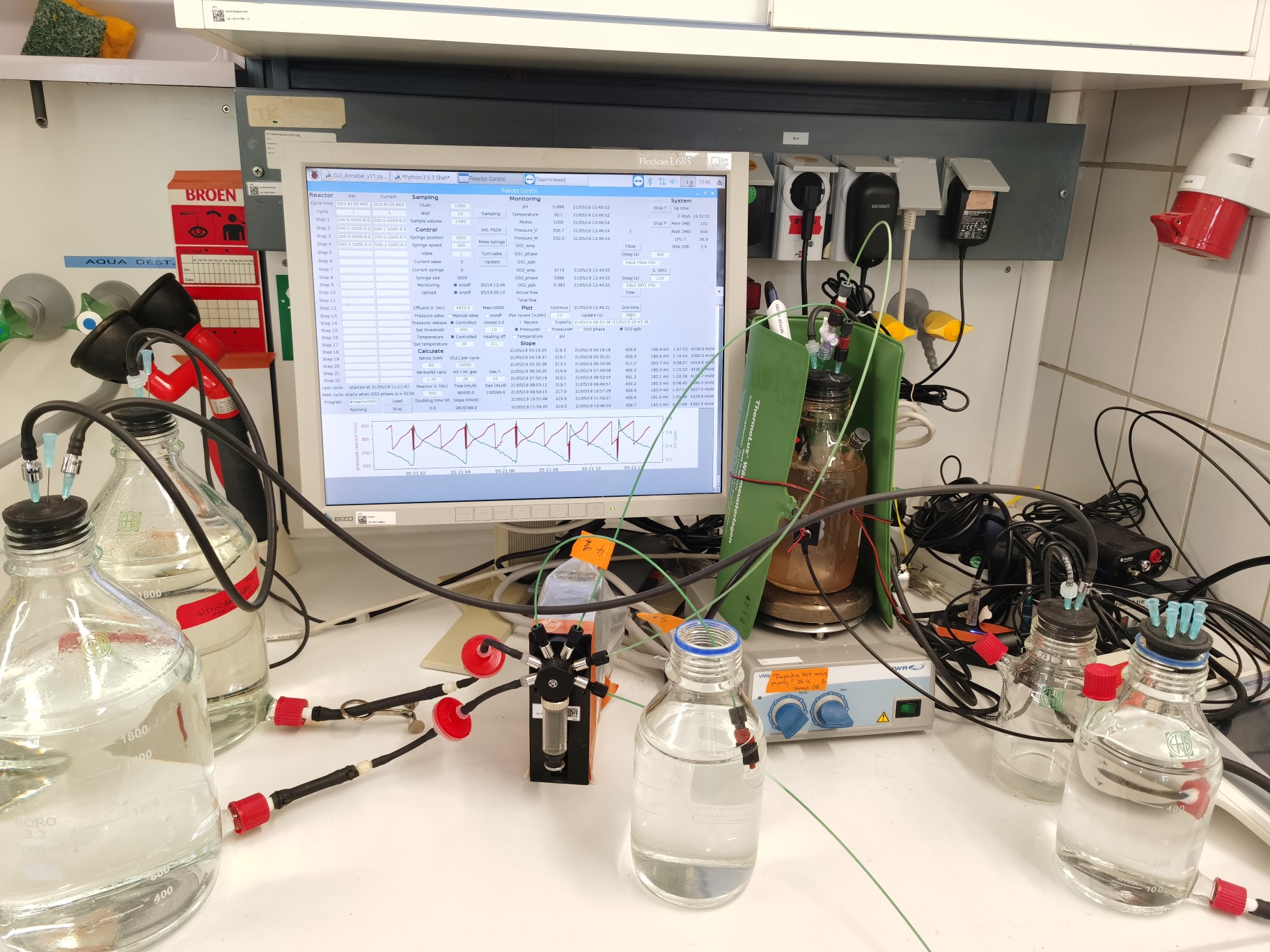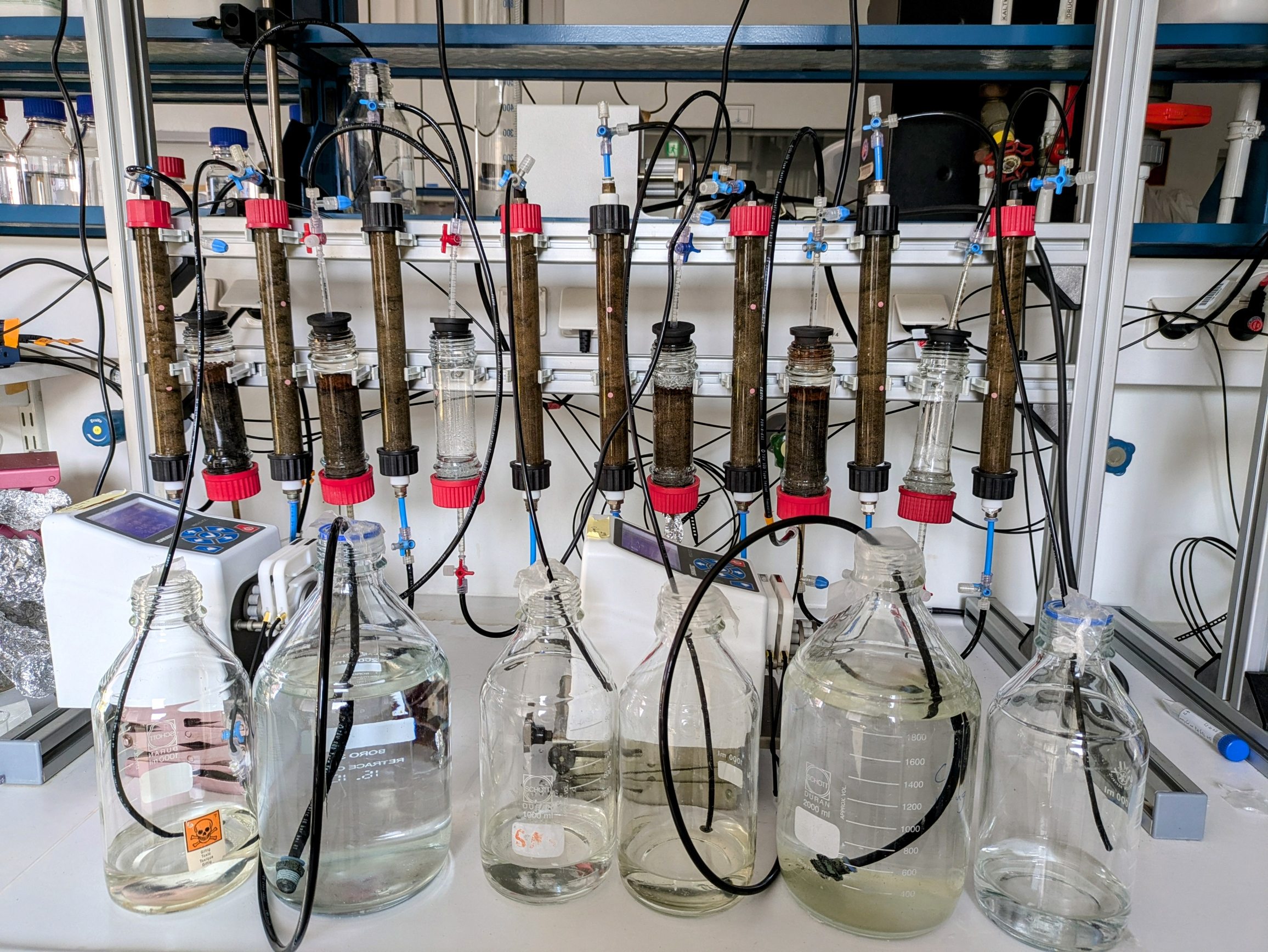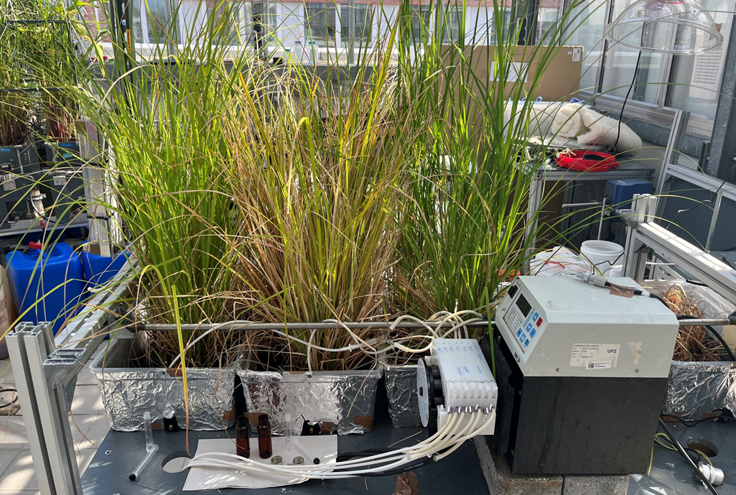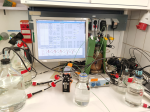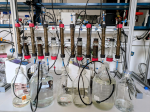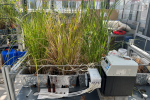Anoxic Microbial Transformation
Research group Dr. Chang Ding
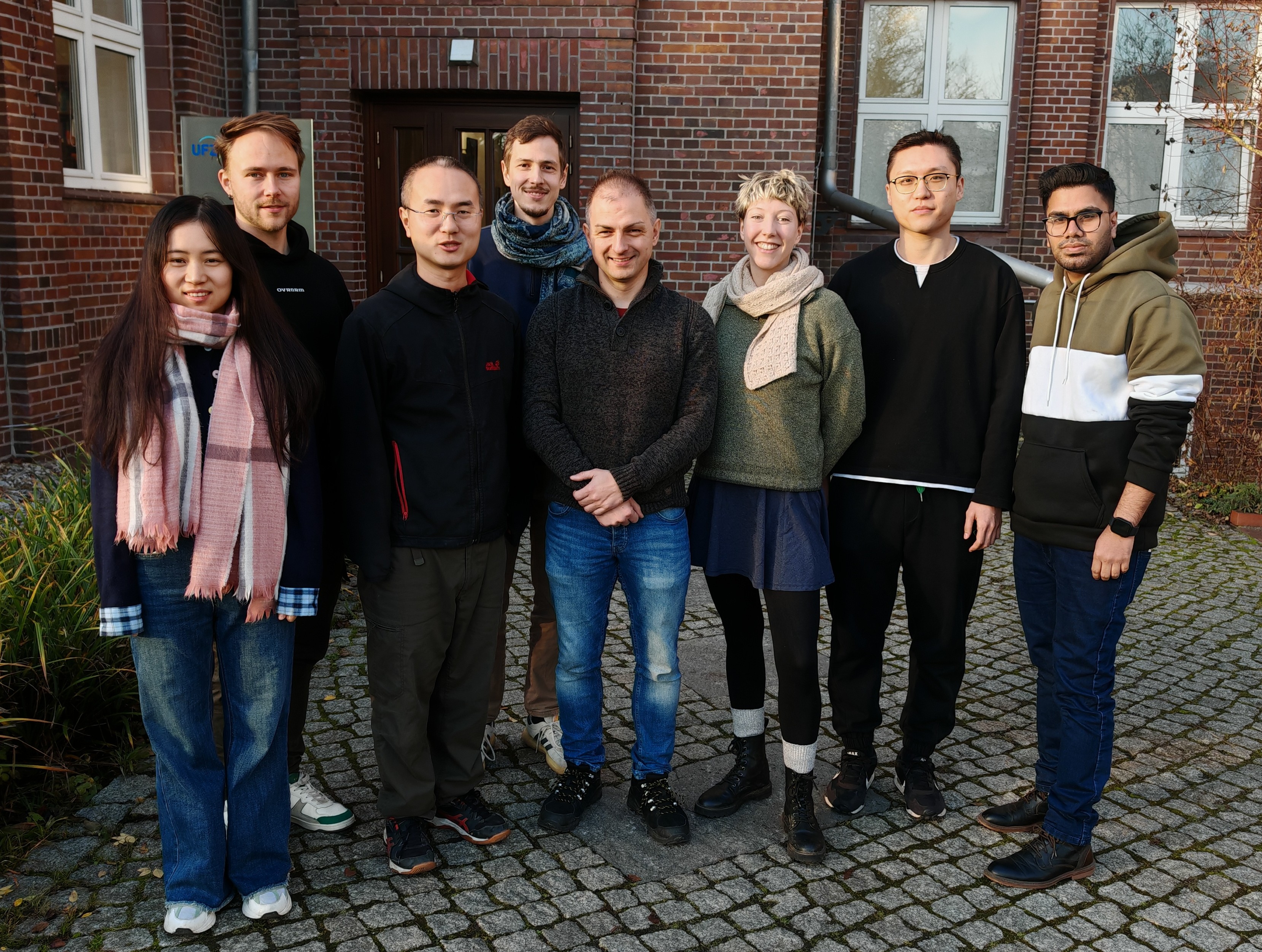

Research focus
Our research focuses on anoxic microbial transformations in technical systems, using a combination of process engineering and molecular approaches. The goal is to provide solutions to efficient and effective removal of contaminants in such systems. Our research is divided into projects that aim at the energy-efficient and climate-friendly wastewater treatment (EFRE/SAB-funded project RE-ENTRY) and those that aim to remove pollutants from surface water, groundwater or gray water.
Technical systems established in the working group include:
- Raspberry Pi-controlled reactors that are able to precisely control growth conditions for fastidious anoxic microorganisms. We have established a continuous stirred-tank reactor that allowed fast growth (0.33 d-1) and real-time activity monitoring of the slow-growing anammox bacterium "Candidatus Kuenenia stuttgartiensis" (Ude et al. 2025, Ding et al. 2018, Ding & Adrian 2020). Such reactor design has also been successfully applied to a strict anaerobe Dehalococcoides mccartyi (Reino et al. 2023).
- Sand columns mimicking the bank filtration process in drinking water treatment systems, where transformations of antibiotics as well as other persistent and mobile organic compounds (PMOCs) are investigated (Project of Jimmy Köpke). We have established delicate controls of dissolved oxygen in the columns which allow us to identify redox conditions that are favorable for contaminants removal.
- Green roof model systems that are designed to treat household gray water. We specifically look at transformation of common gray water contaminants in such green roof systems at different redox conditions (Project of Sarya Derado, UFZ PhD College CLEANER).
The working group has developed or maintained various techniques that are used to study the technical systems, including:
- Proteomics-based approaches including in-solution shotgun proteomics, LiP-MS (Project of Yu Liu), protein stable isotope probing, DIA proteomics, de novo protein sequencing (a pipeline is maintained on UFZ EVE cluster) (see publications Klaes et al. 2025, Liu et al. 2024)
- LC-MS/MS-based analysis of trace organic contaminants (Sciex Triple Quad for MRM and semi-targeted screening, Orbitrap for non-targeted screening) (Akay et al. 2024)
- Anaerobic cultivation and characterization of enrichment cultures in batch systems
- Metagenomics and amplicon sequencing (computational pipelines actively maintained)
Besides, the working group is actively engaged in digitalization of lab journals (elabFTW) and standard operation procedures (hosted on git.ufz.de) and in developing sample and data management systems, in order to promote the FAIR principles (findability, accessibility, interoperability, and reusability) of scientific outputs.
Gallery of established technical systems
Postdoctoral researchers
Meng Li (2020.08-2022.08, visiting scholar from Ocean University of China)
Clara Reino (2019.12-2021.12, Marie Curie Fellowship)
Doctoral researchers
Caglar Akay (2020-2023, defense date: 2025.08.15)
Irantzu Vergara (2024.01-2024.04, visiting scholar from University of the Basque Country, Spain)
Christian White (2023.06-2023.09, visiting scholar from University of California, Berkeley, USA)
Emea Okorafor Ude (2018.10-2023.09, defense date: 2023.09.26)
Master students
Wasim Smirat (2024.05-2025.06, internship & Master thesis)
Jerusalamary James (2024.06-2025.02, internship & Master thesis)
Nishat Tasnim (2024.03-2025.02, internship & Master thesis, defense date: 2025.02.19)
Youssef Elsayed (2024.03-2024.10, internship)
Preethi Bheemagani (2024.08-2025.02, internship)
Sushma Ponnala (2024.09-2024.11, internship)
Lasse Kürschner (2023.04-2024.06, Master thesis)
Theda von Postel (2023.06-2024.02, Master thesis)
Yadav Rimjhim (2022.03-2022.12, 2023.05-2023.10, internship & Master thesis, defense date: 2024.02.15)
Jean-Patrick William Hamlet (2023.02-2023.07, Master thesis)
Harsh Vinay Singh (2023.03-2023.05, internship)
Natalia Stefania Bayona Sarmiento (2022.11-2023.06, Master thesis)
Amrutha Edassery (2022.10-2022.12, internship)
Muhammad Jan Brohi (2022.10-2022.12, internship)
Yidong Li (2022.06-2022.11, internship)
Vinayak Patil (2022.05-2022.07, internship)
Tanyaben Manishbhai Patel (2022.05-2022.07, internship)
Pranathi Sure (2022.03-2023.02, Master thesis, defense date: 2023.12.04)
Patricia Mohedano Caballero (2021.11-2022.01, Erasmus+)
Susiddharthak Chakraborty (2020.10-2021.09, Master thesis)
Bachelor students
Yasmeen Hammoudeh (2024.05-2024.10, Bachelor thesis)
Konstantin Max (2023.02-2023.06, Bachelor thesis)
Khoa Vu (2021.04-2022.01, 2023.02-2023.06, Internship & Bachelor thesis, defense date: 2023.11.08)
Brianna Wensor (2020.11-2021.10, Bachelor thesis)
RE-ENTRY - Resource and energy recovery in wastewater treatment with minimized greenhouse gas emissions (Ressourcen- und Energierückgewinnung in einer Abwasserbehandlung mit minimiertem Treibhausgasausstoß) EFRE/SAB (2025-2027)
AirRoof - Aeration of green roof systems for enhanced greywater treatment - TransFun funding programme, UFZ (2025) Sarya Derado
ResT - Transport, fate and transfer of resistance genes during underground passage and drinking water treatment (Transport, Verbleib und Übertragung von Resistenzgenen bei der Untergrundpassage und Trinkwasseraufbereitung) - In collaboration with UBA, BMG Jimmy Köpke
CLEANER - Fostering pollutant-sink functions of Blue-Green Infrastructures: towards local urban water cycles in climate-resilient cities - PhD Colleage UFZ (2023-2026) Sarya Derado
ActivityProteome - Exploring enzymatic degradation of trace contaminants through proteomics approaches - CSC Scholarship (2021-2025) Yu Liu
Respimmox - UnRaveling the molEcular baSis Promoting Candidatus BrocadIa as the doMinant anamMOX genus in wastewater treatment plants - EU Marie Skłodowska-Curie grant (2019-2021) Clara Reino-Sánchez
Physiological and biochemical characterization of anammox bacteria for the integration of their activity into anoxic treatment workflows - PhD Fellowship by Petroleum Technology Development Fund (PTDF) and Deutscher Akademischer Auslandsdienst (DAAD) (2018-2022) Emea Ude
AnammoxZim - Use of a planktonic cultivation process to establish a stable and rapidly regenerable two-stage anammox system (Nutzung eines planktonischen Kultivierungsverfahrens zur Etablierung einer stabilen und schnell regenerierbaren zweistufigen Anammox-Anlage) - ZIM cooperation project (ZIM-Kooperationsprojekte), BMWK (2018-2020) Chang Ding
Trihalide - Investigation into microbial respiration with trihalomethylated compounds - Humboldt Fellowship (2015-2018) Chang Ding
- Klaes S., White C., Alvarez-Cohen L., Adrian L., Ding C. (2025):
De novo peptide databases enable protein-based stable isotope probing of microbial communities with up to species-level resolution
Environmental Microbiome. 20, 111 - Ude E.O., Sure P., Rimjhim R., Adrian L., Ding C. (2025):
Fractionating proteins with nitrite-reducing activity in "Candidatus Kuenenia stuttgartiensis" strain CSTR1
Frontiers in Microbiology. 16, 1483703 - Liu Y., Rohwerder T., Bonatelli M.L., von Postel T., Kleinsteuber S., Adrian L., Ding C. (2024):
A novel sulfatase for acesulfame degradation in wastewater treatment plants as evidenced from Shinella strains
Environmental Science & Technology. 58, 18892–18902 - Akay C., Ulrich N., Rocha U., Ding C., Adrian L. (2024):
Sequential anaerobic–aerobic treatment enhances sulfamethoxazole removal: From batch cultures to observations in a large-scale wastewater treatment plant
Environmental Science & Technology. 58, 12609-12620 - Ude E.O., Haas J., Kayoum M.K., Ding C., Adrian L. (2023):
Effects of reducing, stabilizing, and antibiotic agents on "Candidatus Kuenenia stuttgartiensis"
Applied Microbiology and Biotechnology. 107, 1829-1843 - Reino C., Ding C., Adrian L. (2023):
Continuous cultivation of Dehalococcoides mccartyi with brominated tyrosine avoids toxic byproducts and gives tight reactor control
Water Research. 229, 119396 - Ding C., Enyi F.O., Adrian L. (2018):
Anaerobic ammonium oxidation (anammox) with planktonic cells in a redox-stable semicontinuous stirred-tank reactor
Environmental Science & Technology. 52, 5671-5681
Thesis / job opportunities
We offer topics for Bachelor's or Master's thesis projects. We welcome applications for doctoral and postdoctoral positions through scholarships (DAAD, Humboldt, Marie Curie, CSC, etc).
Please contact Dr. Chang Ding for further details.
Contact / Address
Helmholtz Centre for Environmental Research - UFZ
Department Molecular Environmental Biotechnology
Permoserstraße 15 | 04318 Leipzig | Germany

